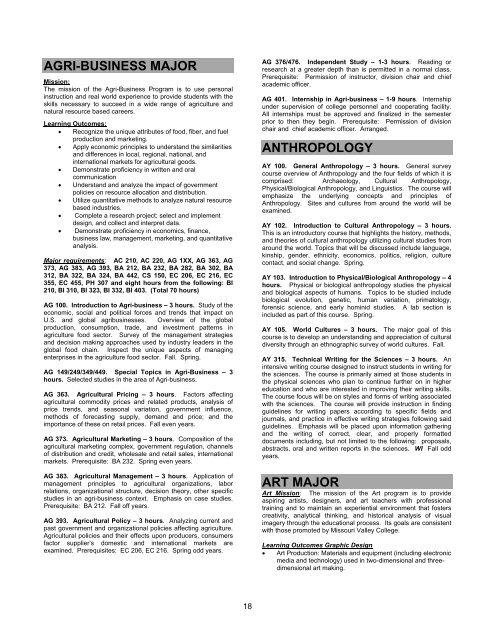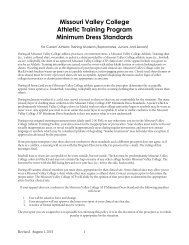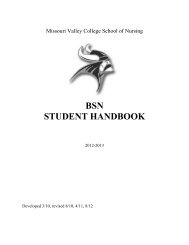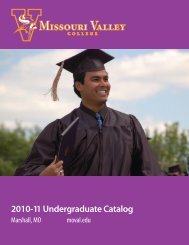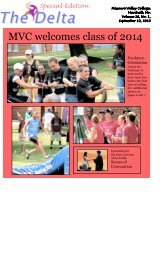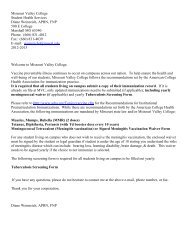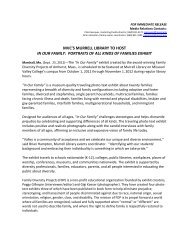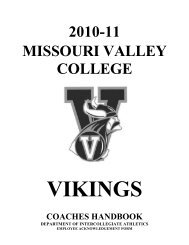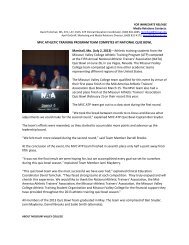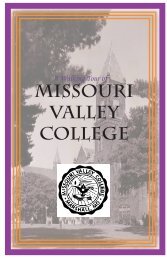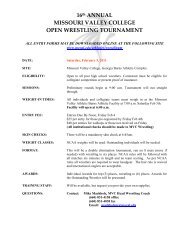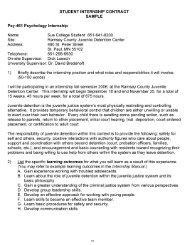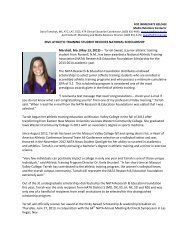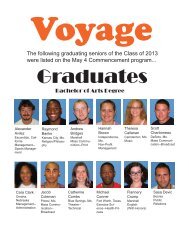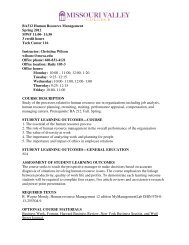2012-13 Undergraduate Catalog - Missouri Valley College
2012-13 Undergraduate Catalog - Missouri Valley College
2012-13 Undergraduate Catalog - Missouri Valley College
You also want an ePaper? Increase the reach of your titles
YUMPU automatically turns print PDFs into web optimized ePapers that Google loves.
AGRI-BUSINESS MAJOR<br />
Mission:<br />
The mission of the Agri-Business Program is to use personal<br />
instruction and real world experience to provide students with the<br />
skills necessary to succeed in a wide range of agriculture and<br />
natural resource based careers.<br />
Learning Outcomes:<br />
Recognize the unique attributes of food, fiber, and fuel<br />
production and marketing.<br />
Apply economic principles to understand the similarities<br />
and differences in local, regional, national, and<br />
international markets for agricultural goods.<br />
Demonstrate proficiency in written and oral<br />
communication<br />
Understand and analyze the impact of government<br />
policies on resource allocation and distribution.<br />
Utilize quantitative methods to analyze natural resource<br />
based industries.<br />
Complete a research project; select and implement<br />
design, and collect and interpret data.<br />
Demonstrate proficiency in economics, finance,<br />
business law, management, marketing, and quantitative<br />
analysis.<br />
Major requirements: AC 210, AC 220, AG 1XX, AG 363, AG<br />
373, AG 383, AG 393, BA 212, BA 232, BA 282, BA 302, BA<br />
312, BA 322, BA 324, BA 442, CS 150, EC 206, EC 216, EC<br />
355, EC 455, PH 307 and eight hours from the following: BI<br />
210, BI 310, BI 323, BI 332, BI 403. (Total 70 hours)<br />
AG 100. Introduction to Agri-business – 3 hours. Study of the<br />
economic, social and political forces and trends that impact on<br />
U.S. and global agribusinesses. Overview of the global<br />
production, consumption, trade, and investment patterns in<br />
agriculture food sector. Survey of the management strategies<br />
and decision making approaches used by industry leaders in the<br />
global food chain. Inspect the unique aspects of managing<br />
enterprises in the agriculture food sector. Fall. Spring.<br />
AG 149/249/349/449. Special Topics in Agri-Business – 3<br />
hours. Selected studies in the area of Agri-business.<br />
AG 363. Agricultural Pricing – 3 hours. Factors affecting<br />
agricultural commodity prices and related products, analysis of<br />
price trends, and seasonal variation, government influence,<br />
methods of forecasting supply, demand and price; and the<br />
importance of these on retail prices. Fall even years.<br />
AG 373. Agricultural Marketing – 3 hours. Composition of the<br />
agricultural marketing complex, government regulation, channels<br />
of distribution and credit, wholesale and retail sales, international<br />
markets. Prerequisite: BA 232. Spring even years.<br />
AG 383. Agricultural Management – 3 hours. Application of<br />
management principles to agricultural organizations, labor<br />
relations, organizational structure, decision theory, other specific<br />
studies in an agri-business context. Emphasis on case studies.<br />
Prerequisite: BA 212. Fall off years.<br />
AG 393. Agricultural Policy – 3 hours. Analyzing current and<br />
past government and organizational policies affecting agriculture.<br />
Agricultural policies and their effects upon producers, consumers<br />
factor supplier’s domestic and international markets are<br />
examined. Prerequisites: EC 206, EC 216. Spring odd years.<br />
AG 376/476. Independent Study – 1-3 hours. Reading or<br />
research at a greater depth than is permitted in a normal class.<br />
Prerequisite: Permission of instructor, division chair and chief<br />
academic officer.<br />
AG 401. Internship in Agri-business – 1-9 hours. Internship<br />
under supervision of college personnel and cooperating facility.<br />
All internships must be approved and finalized in the semester<br />
prior to then they begin. Prerequisite: Permission of division<br />
chair and chief academic officer. Arranged.<br />
ANTHROPOLOGY<br />
AY 100. General Anthropology – 3 hours. General survey<br />
course overview of Anthropology and the four fields of which it is<br />
comprised: Archaeology, Cultural Anthropology,<br />
Physical/Biological Anthropology, and Linguistics. The course will<br />
emphasize the underlying concepts and principles of<br />
Anthropology. Sites and cultures from around the world will be<br />
examined.<br />
AY 102. Introduction to Cultural Anthropology – 3 hours.<br />
This is an introductory course that highlights the history, methods,<br />
and theories of cultural anthropology utilizing cultural studies from<br />
around the world. Topics that will be discussed include language,<br />
kinship, gender, ethnicity, economics, politics, religion, culture<br />
contact, and social change. Spring.<br />
AY 103. Introduction to Physical/Biological Anthropology – 4<br />
hours. Physical or biological anthropology studies the physical<br />
and biological aspects of humans. Topics to be studied include<br />
biological evolution, genetic, human variation, primatology,<br />
forensic science, and early hominid studies. A lab section is<br />
included as part of this course. Spring.<br />
AY 105. World Cultures – 3 hours. The major goal of this<br />
course is to develop an understanding and appreciation of cultural<br />
diversity through an ethnographic survey of world cultures. Fall.<br />
AY 315. Technical Writing for the Sciences – 3 hours. An<br />
intensive writing course designed to instruct students in writing for<br />
the sciences. The course is primarily aimed at those students in<br />
the physical sciences who plan to continue further on in higher<br />
education and who are interested in improving their writing skills.<br />
The course focus will be on styles and forms of writing associated<br />
with the sciences. The course will provide instruction in finding<br />
guidelines for writing papers according to specific fields and<br />
journals, and practice in effective writing strategies following said<br />
guidelines. Emphasis will be placed upon information gathering<br />
and the writing of correct, clear, and properly formatted<br />
documents including, but not limited to the following: proposals,<br />
abstracts, oral and written reports in the sciences. WI Fall odd<br />
years.<br />
ART MAJOR<br />
Art Mission: The mission of the Art program is to provide<br />
aspiring artists, designers, and art teachers with professional<br />
training and to maintain an experiential environment that fosters<br />
creativity, analytical thinking, and historical analysis of visual<br />
imagery through the educational process. Its goals are consistent<br />
with those promoted by <strong>Missouri</strong> <strong>Valley</strong> <strong>College</strong>.<br />
Learning Outcomes Graphic Design<br />
Art Production: Materials and equipment (including electronic<br />
media and technology) used in two-dimensional and threedimensional<br />
art making.<br />
18


